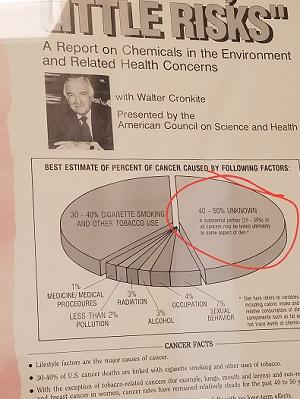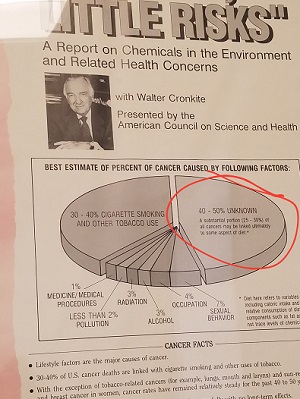
Decades ago, when activist groups were promoting every trace chemical they could find as a carcinogen (1), the American Council on Science and Health debunked a lot of those myths with the help of Walter Cronkite, the long-time CBS anchor who had become known as “the most trusted man in America.”
The documentary was called "Big Fears, Little Risks" and what we importantly noted was that an alarming number of cancers were caused by smoking and obesity. Joining Cronkite in that documentary were people like Dr. John Higginson, the first director of the International Agency for Research on Cancer (IARC), and Dr. Bruce Ames, creator of the Ames Test. Cronkite was already a legend and that documentary made him more so.
If you watch it now, you will be surprised how timeless it is. Some of the names of the chemicals have changed but the chemophobia hasn't. We famously showed Natural Resources Defense Council and Fenton Communications to be frauds on the "60 Minutes" program, manufacturing the "alar on apples" scare, but that didn't stop NRDC from doing the same thing about mercury in salmon a few years later. Now they call everything an endocrine disruptor and claim bees are dying and only a big check for them will save the planet.
We've never chased the big check, we simply told Americans to ignore scaremongering and that it was safe to go into the kitchen again. As we noted then, cancer hasn't gone up, just the causes move around. There was a lot more smoking related cancer then but thanks to our work, there will be a lot fewer cancers caused by cigarettes in the future. That doesn't mean cancer will plummet.
When I saw a new CDC report noting that 40 percent of cancers were linked to lifestyle issues, in this case obesity, I turned to my wall and took this picture:

We've been saying it for a long time, just the percentage has changed as America got more obese. According to the CDC, 630,000 Americans got a cancer associated with obesity in 2014, an increase of seven percent from 2005. Meanwhile, the epidemic of cancers we were told we were sure to get due to chemicals by NRDC, CSPI, EWG and all the rest? Never happened. They were then, as now, a revenue-generating myth, just as we assured the public.
That's not to brag. We were created to debunk health scares and warn people about health threats, and obesity and smoking were the two big ones we focused on then and still do now. (2) In context, obesity is actually a good problem to have, at least compared to the alternative. When I was a kid we were in the age of the Population Bomb and writers like Drs. Paul Ehrlich, Anne Ehrlich and John Holdren were promoting worries about mass starvation and discussing the practicality of mandatory sterilization and forced abortion to prevent it.
American farmers now feed more people on less land, using less water, less energy and with less environmental strain than at any time in history. American science has made agriculture so strong that even the organic food process, which couldn't adequately feed Americans as recently as 1800, can be a thriving food segment for elites in 2017.
And despite expensive settlements from Johnson & Johnson when it comes to things like baby powder, no one scientifically literate really believes that trace chemicals are killing us any more. Erin Brockovich had her day, she wrangled a big settlement out of an energy company scaremongering Chromium-6 in water, but cancer actually turned out to be lower in the town where she convinced opposing counsel there was a "cancer cluster." They didn't want to go in front of a jury, just like a company that makes baby powder does not want a jury trial today.
Why? Well, it's no mystery. Even though they have been debunked repeatedly, environmentalists still have a solid business model in selling chemophobia. Fear makes money, while 'your food is safe' remains a lousy business model. No matter, we'll continue to do our job even though anti-science groups that were once the same size as us now have 10 to 15 times as much revenue.
Cronkite had a reputation for honesty and so do we. If we tell you something is a worry, you can worry. Until then, it's safe to go into the pantry. Just don't go too often.
NOTES:
(1) And in the case of litigation groups like Center for Science in the Public Interest, any food. They even claimed for decades that coffee caused breast cancer. When we debunked their crazy claims, they hired an Earth Day PR person to write a hit piece on us called Voodoo Science, Twisted Consumerism (below). Yes, though we were right about caffeine and breast cancer, because it hurt their lawsuit they paid an environmental activist to claim we were the bad consumer advocates.

(2) Activists groups, however, continue doing the same thing. Just the names have changed. Now they insist things like BPA in cans or GMOs in food are what is responsible for cancer, and even obesity. It makes as much as sense now as it did then.



